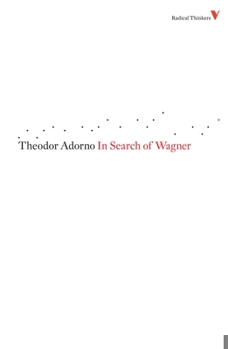In Search of Wagner
Select Format
Select Condition 
Book Overview
This new edition includes a lengthy foreword by Slavoj Zizek, entitled "Why is Wagner worth saving?" This description may be from another edition of this product.
Format:Paperback
Language:English
ISBN:1844673448
ISBN13:9781844673445
Release Date:June 2009
Publisher:Verso
Length:176 Pages
Weight:0.45 lbs.
Dimensions:0.6" x 5.0" x 7.5"
Customer Reviews
3 ratings
philosophical, sociological, and musical analyses
Published by Thriftbooks.com User , 15 years ago
Brilliant criticism and insight by one of the most influential philosophers of the mid-twentieth century. The introduction by "The Giant of Ljubjana," Slavoy Zizek, is alone worth the cost of the volume. Adorno is uniquely qualified by his encyclopedic knowledge, his profession of philosopher, and his extensive familiarity of music: many commentators have written exclusively about Wagner's sociological paradigms (e.g. George Bernard Shaw), or Wagner's philosophy of renunciation (Nietzsche), or Wagner's mythological influences (Joseph Campbell), or the music itself (Deryck Cooke). Adorno's analysis of Wagner, on the other hand, not limited to one type of analysis but provides a rare synthesis of many different insights. One caveat: an extensive familiarity with Wagner is assumed by this volume. To get the most out of this book, the reader should be familiar with the plots of Wagner's operas (they are ALL discussed). Additionally, the reader should have at least some background in music theory: enough to know that a dominant followed by a submediant is a deceptive cadence, that an F# over an E major triad forms a V9 chord, and basic definitions of terms like "leitmotiv," "development," etc.
new translation of work by influential 20th-century thinker
Published by Thriftbooks.com User , 19 years ago
The European emigre writer Adorno is a major mid 20th century author identified with the Frankfurt School of social criticism. Although this School is usually described as having a Marxist perspective, the social criticism of Adorno is not doctrinaire or propagandistic. Adorno's writings--as this current publication testifies again--have stood the test of time for their acuteness, rigor, and application of first-rate intellectual powers to subjects of the contemporary society. These qualities of Adorno's critical thinking are evident as well in his work "In Search of Wagner." In a 20-page introductory foreword, the philosopher/social critic Slavoj Zizek takes up the question "Why Is Wagner Worth Saving?" Wagner's music, ideas, and biography continue to draw the attention of thinkers in various fields because exploration of these and positions reached regarding them yield insights and assessments on power, anti-Semitism, art, psychology, and politics in the modern world. Written in the late 1930s, "In Search of Wagner" demonstrates Adorno's innovative, timely, and valuable methodology as it grapples with central questions of modern culture.
great probing analysis into the last Romantic
Published by Thriftbooks.com User , 19 years ago
Adorno wrote this as a response to the growing inflated enthusiasm of Wagner's Operas during the War Years,with the darkest pages of Europa.It was inevitable the Third Reich was to seize upon these works primarily the more facile operas as 'Die Meistersinger','Lohengrin', and leave the more controversial RING to languish for history to ponder. Adorno always had a nerve-ending unbalanced by Wagner's penchant for the arbitrary largesse, the amplitude, the inflated-ness of his creative procedures,the "Gesamtkunstwerk", that while addressing the problems of all artistic genres resolved none of them in the end. Wagner's pathological ways of endowing characters and dramatic situations as sometimes reflections of things he himself had experienced was not the way to proceed in art,but skewed imagery that worked nonetheless in certain respects like his trip to the hellish London Docks as a metaphor for the oppressive beneath the earth Nibelungen-land.His inconsistentcy of character building as the power of the gods being determined by Wotan's Security Agreements with himself.Well this conceit is what had preserved the aristocracy in Europa,again as a metaphor in the "Ring". Poor Brunnhilde,once a god for example becomes a mortal,but it was necessary for her to have to bring the destruction of the gods. (None of her Sister Walkure helped) Adorno utilized the "fetish" concept from Marx his entire life it was a triggering point for determining what had remained "Art" for him and what had transgressed into the vagaries of whatever the market had necessitated as popular culture, detective film noirs jazz and the post-war avant-garde. Some beleive Adorno went a bit into the metaphysical for no known reason and the jazz he had listened to was the surface kind Hollywood would have promoted, he never heard John Coltrane for example or Cecil Taylor.(It is odd that Adorno only found "innovative-ness" in certain forms and not others, Schoenberg and not Stravinsky) But with Wagner he is on his own turf with the hypocrisies residing within modern German culture(something the Ring had profoundly represented actually) of the Junker ruling Classes as he had looked at what culture was promoted and what then was considered"subversive" (His diatribe against Richard Strauss is another example where he claimed his melodies reached for the sky without much content or constructive ontology as the Krupp & Thyssen smokestakes from the Ruhr Valley. The book on Wagner has chapters on various aesthetic categories, "Tone", "Dramaturgy","The Social" "Text","Orchestration", and "Phantasmagoria" that"other" dimension. Wagner was in fact far-looking, he thought of his operas as time related "cinemas" inhabiting durational frames of the magical,Valhalla, the Real and the Below-the-Earth,different levels of the Symbolic, The Imaginary,and the Real;( Lacan in retrospect would have been a good reservoir for analysis as well.(See Slavoj Zizek's writings on opera) Adorno's primary argument





